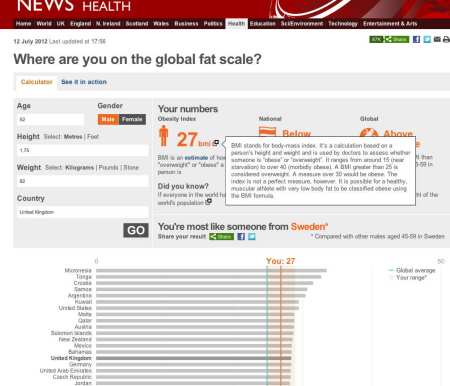
Where I lie on the BBC Global Fat Scale. Under average for the UK – over average for the world. But the text in the ‘info’ box (shown enlarged in the figure below) has been changed. Click for larger image.
One of the most interesting features of modern media is that if one makes a mistake, it can be corrected quickly and the original error then disappears. Anyone who accidentally witnessed the transient error is then left with a feeling of bewilderment when they try to show the mistake to their friends. They may even experience a feeling of paranoia. I take advantage of this feature regularly on this blog, and the more august BBC took advantage this week when it erred in an article on Body Mass Index (BMI).
Both myself and one of my international network of informants noticed that the ‘hover over’ information text stated that having an above ‘normal’ BMI caused increased mortality – an increased risk of death. As I mentioned in a previous article, this appears to be not true. In fact being ‘overweight’ (BMI 25 to 30) appears to reduce mortality. Even being ‘obese’ (BMI 30 to 35) appears to give a reduced risk of death. Before I could write to the BBC about this, they removed the offending text, leaving me and my informant scratching our heads.
This matters. If the BBC, or the government, or a health authority, encourages people to move from the ‘obese’ or ‘overweight’ categories to the ‘normal’ category, then they are encouraging them to die earlier. Generally we consider ‘dying younger’ to be a ‘bad thing’. But that is what the statistical evidence indicates and that presumably is why the BBC chose to remove this reference.
There are two lessons to learn from this episode.
Firstly, reputable media, such as the LA Times, make a note on a page to record the fact that it has been updated since publication. This should be routine in a public organisation such as the BBC. They should not try to re-write history.
Secondly, the article in itself is profoundly flawed. It ranks a large number of countries but fails to note that the bottom half of the list are countries in which the populace is profoundly and tragically undernourished. The mortality data indicate that the ‘normal’ BMI categories may well have been drawn up in a time when our population was malnourished. Being overweight may not the most beautiful condition, but the data tells us that in terms of living longer, its the best condition to be in. And that is something this chubby 52 old (BMI = 27) feels pretty good about.
============
Published first at 12:09 a.m. on the 19th July 2012

July 19, 2012 at 9:00 am |
There is an even more worrying hypothesis as to why they changed it. It might be because they feared they were causing their readers ‘distress’. It’s one thing to correct yourself if you’re wrong, quite another to censor yourself in case someone gets upset by the truth. Like you I have a vested interest in the truth of this. I’ve lost over 7kg in 2 months, successfully hitting BMI of 25, and while I care more about not carrying a bowling ball’s mass of fat around with me than the marginal effect it might have on my mortality, it would be nice to clarify whether I’m likely to live longer or not as a result of this effort!
July 19, 2012 at 7:49 pm |
Interesting – I missed the original post but had a look at it now. Correlation/causation confusion perhaps? BMI could reflect all sorts of physiological and psychological conditions that affect mortality more than BMI itself. One very obvious example is alcoholism – alcoholics are seldom fat in my experience but it’s not a healthy lifestyle.
November 11, 2013 at 10:23 pm |
[…] a correction has been made. This is common practice at The Guardian or the LA Times. But it is not practiced at the BBC who change stories – but leave no record that they ever got anything wrong in the first […]